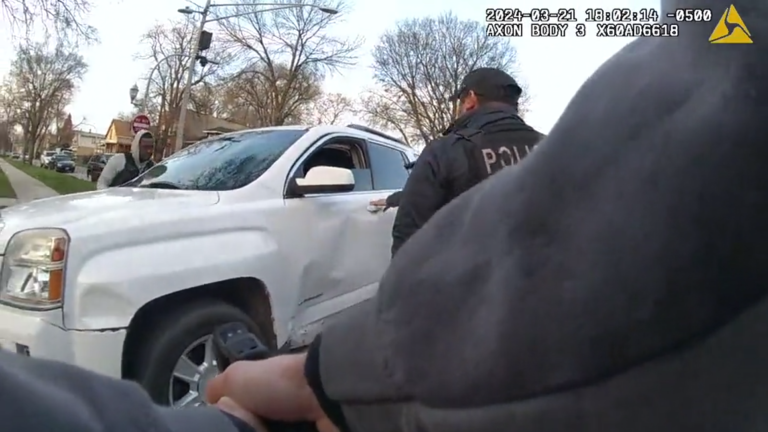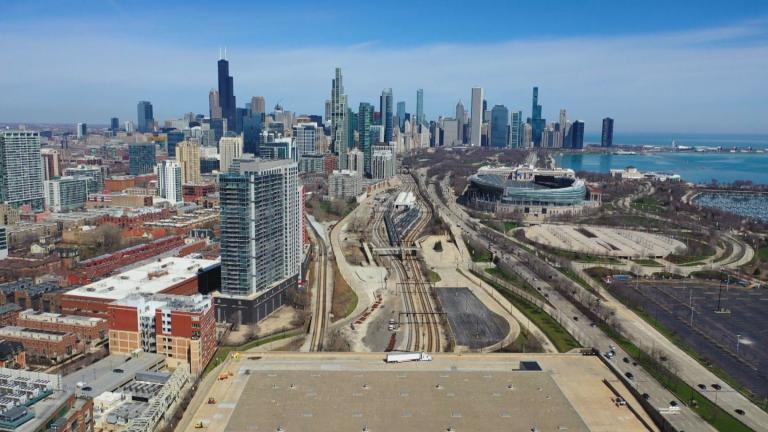Video: The WTTW News Spotlight Politics team talks the Bring Chicago Home proposal and more Election Day news. (Produced by Paul Caine)
A measure that will determine whether the Chicago City Council should have the power to hike taxes on the sales of properties worth $1 million or more to fight homelessness trailed Tuesday night, according to the Chicago Board of Election Commissioners.
With about 98% of precincts counted, approximately 54% of voters were rejecting Ballot Question No. 1, better known as Bring Chicago Home, according to unofficial totals as of 10:45 p.m.
There are about 110,000 outstanding mail-in ballots and election officials say they expect about 80 to 85% to be returned based on previous elections.
Neither side conceded the race Tuesday, which could make history. The last time Chicago voters passed a binding referendum that applied to the entire city was 1885, when they voted to create the Chicago Board of Election Commissioners, according to city records.
Supporters of the measure said they would continue to fight to help unhoused Chicagoans.
"While tonight’s election results are disappointing, we are nowhere near the end of our journey," according to a statement.
Michael Glasser, president of the Neighborhood Building Owners Alliance, vowed to work with city officials to help end homelessness.
"While the results for this race may not be final, the passion of both sides is clear: we all want to make Chicago a better place to live," Glasser said.
Election Day came nearly a month after a Cook County judge invalidated the ballot question, only to have that ruling reversed by the Illinois Appellate Court, a decision that was upheld by the Illinois Supreme Court.
The race was a test of the political muscle of Chicago’s progressive political movement, which has been pushing since 2019 to raise the city’s Real Estate Transfer Tax on properties worth more than $1 million to create a dedicated source of funding to help unhoused Chicagoans.
Mayor Brandon Johnson, elected mayor with the enthusiastic support of the groups now behind Bring Chicago Home, has urged voters to approve the measure, saying city officials have a moral obligation to house as many vulnerable Chicagoans as possible to confront the growing number of unhoused residents while ensuring wealthy residents of Chicago pay their fair share.
But a coalition of real estate and development groups sued to knock the measure off the ballot, while campaigning vigorously against the measure that they contend could cause the city’s already-struggling commercial real estate market to collapse amid the shift to remote work.
The proposal would slash the real estate transfer tax paid by Chicagoans who sell residential and commercial properties for less than $1 million by 20%, while hiking taxes on transactions of more than $1 million by as much as 400%.
That would generate approximately $100 million annually, which supporters say would be enough to address the root causes of homelessness by building new permanent housing that offers wraparound services like substance abuse counseling in an effort to combat crime and poverty throughout Chicago.
An August report from the Chicago Coalition for the Homeless, a member of the coalition that crafted the Bring Chicago Home proposal, found that the number of Chicagoans who do not have a permanent home grew 4% between 2020 and 2021, to 68,440 people.
State law does not give the City Council the power to change the transfer tax on its own authority. Without legislation passed by the General Assembly and signed by the governor, the measure needs the support of Chicago voters through a referendum before the City Council can levy the tax and collect the funds.
Under the current law, the buyer of a home worth $300,000 pays the same flat transfer tax as the buyer of a multimillion-dollar mansion or downtown skyscraper — a fact that supporters of the change contend is unfair and contributes to income inequality in Chicago.
The seller of a home sold for $500,000 now pays $3,750 in real estate transfer taxes, a 0.75% tax rate. If voters pass the binding referendum, and the City Council agrees to levy the tax, that cost would drop to $3,000, or a 0.60% tax rate, officials said.
Nearly 94% of all properties sold in Chicago have a final purchase price of less than $1 million, officials said.
The transfer tax on properties sold for more than $1 million would spike by 233%, but apply to just to the amount of the sale greater than $1 million, in an effort to ensure the measure withstands a legal challenge and reduces the incentive for sellers to artificially lower sale prices, according to the proposal.
For example, the seller of a property that sells for $1.2 million now pays $9,000 in transfer taxes. Under the revised proposal, that would rise to $10,000, with the higher tax rate of 2% applied to just $200,000 of the sale price, according to the proposal.
Using the same mechanism, the transfer tax on properties sold for more than $1.5 million would spike by 400% with the increase only applying to the amount of the sale greater than $1.5 million, according to the proposal.
Contact Heather Cherone: @HeatherCherone | (773) 569-1863 | [email protected]








